

It's no secret that many of the fairytales we know and love today are pretty sexist. Take Sleeping Beauty or Little Red Riding Hood: helpless heroines who need men to save them. In other stories, the women can only redeem the men through their own sacrifices, and in others, they suffer violent ends, whether deserved or undeserved. Yet women are the primary keepers and transmitters of stories like these: mothers, grandmothers, maids, and nurses have kept them alive from generation to generation by sharing them with the children they watch over. If that's so, why do the stories treat women so harshly?
Emily Ingram's The Grandmothers Grimm provides us with the answer: while women may have created and told the stories, it was men who wrote them down. Featuring a four-person cast, the play takes place on a night when Marie Hassenpflug, a young woman from a well-to-do family, visits Jacob and Wilhelm Grimm to hear and exchange fairytales for the new anthology the brothers are working on. Presented at the North Carolina State University's Frank Thompson Hall (and presented online through livestream and prerecorded video), the show is part of the 8th annual National Women's Theatre Festical (WTF).
The play starts with Marie and the brothers acting out a much darker, much more sexualized version of Little Red Riding Hood than most of us are familiar with, which Marie heard from her family's maid. When one of the brothers suggests that the maid must have stolen the tale from Charles Perrault, Marie is understandably offended. But when it's established that the maid couldn't read, and that Marie heard the story from her long before Perrault's published version came out, all are forced to agree that Perrault must be the one who "stole" it.
Of course, "stealing" tales is just another word for writing them down, and authors as old and as storied as Shakespeare himself have been known to do it. But what Marie objects to is not the brothers' writing the stories down; rather, it's the fact that they present sexist versions of the tales and don't credit the women who created, or at least preserved, them. This is chillingly conveyed in the play through the presence of a character who remains largely ignored and unnamed until the very end: the Grimms' housekeeper. Clad in a gray dress and bonnet, she seems like a manifestation of the many lower-class German women from whom the brothers have taken their tales. While the brothers reap fame and fortune from the anthology, they women to whom the tales truly belong don't even get a sentence in the acknowledgements section. But this, of course, is nothing new either.
Though there's a sense throughout the production that some of the actors could have used just one or two more practice runs, Ingram's script is biting and illuminating. Raising interesting questions (should stories be preserved as is or improved in the telling? which tales are worthy of being recorded? how important is it for stories to have a good moral?), The Grandmothers Grimm casts Grimm's fairytales in a new light, and demands that we reread them in new ways.